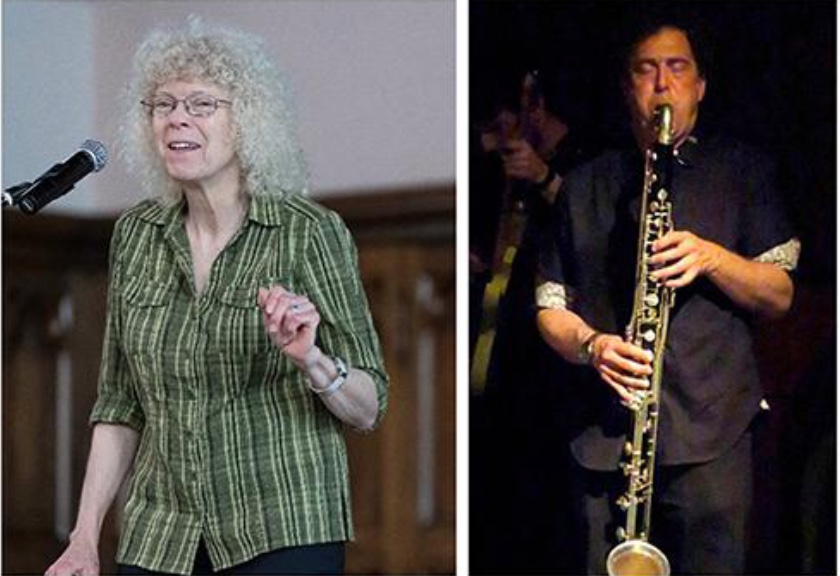by Daniel Hathaway

On June 9, in a collaboration with the Cleveland Humanities 2024 Festival, bird and insect song was the subject of an engaging, illustrated, half-hour lecture, “The World’s First Musicians” by composer and naturalist Lisa Rainsong. On June 16, in “Earth Makes Us Equal,” the songs of male humpback whales (the females don’t sing!) was the topic of a fascinating talk by David Rothenberg, Distinguished Professor of Philosophy at the New Jersey Institute of Technology, who brought his bass clarinet along to engage in expressive duets with some of his subjects.
Both lecturers treated their animal subjects with great respect, avoiding Disneyfication. Rainsong acknowledged that what may sound like cheerful twitterings to us might well be “get away from my tree” warnings to other avians, and Rothenberg noted that we didn’t know that whales sang until World War II, when the U.S. Navy got interested in listening underwater for submarines. But we still don’t really know why humpbacks vocalize.
After a break for cookies and lemonade, the program on June 9 continued with Lili Boulanger’s D’un matin de printemps, Kaija Saariaho’s Light and Matter, Ralph Vaughan Williams’ Phantasy Quintet, and Felix Mendelssohn’s Octet.
The Boulanger, a spirited piece of French salon music depicting a morning in spring, was charmingly presented by violinist Brendan Shea, cellist Amit Even-Tov, and pianist Christina Dahl. That distinguished trio reassembled for an appropriately cosmic performance of the Saariaho, which begins with low growlings from the cello followed by sharp, angular sounds, sparks of light that flash out from primordial matter, and sudden starts and stops that suggest attempts to give shape to a universe.
Just when you think you have a decent grasp on the catalog of a favorite composer, you encounter a piece like the Vaughan Williams Quintet for the first time. Violinists Paul Kantor and Sibbi Bernhardsson, violists Lynne Ramsey and Ivo-Jan van der Werff, and cellist Dmitry Kouzov perfectly captured the pastoral spirit of the English countryside. The composer’s decision to drop the cello line and mute the rest of the strings brought a special sound to the third-movement Alla Sarabanda, and the Burlesca concluded the work with a festive dance before returning to the opening material for a palindromic ending.
You can count on Mendelssohn’s Octet to end a concert with a burst of infectious, youthful energy, and violinists Jinjoo Cho, Jueun Lee, Byeol Claire Kim, and Sibbi Bernhardsson, violists Abigail Rojansky and Semin Yim, and cellists Brannon Cho and Max Geissler supplied plenty of that quality. Robust textures, fine dynamic changes and mood shifts, and seamless transitions distinguished this performance.
After whale song and cookies and lemonade on June 16, violinists Mihaela Martin and Jinjoo Cho, violist Mathieu Herzog, and cellist Frans Helmerson gave an expressive performance of Anton Webern’s early Langsamer Satz, a beautiful, lush, Romantic movement that makes you wonder why the composer ever jumped ship to adopt a radically different style.
Like the previous week’s Vaughan Williams, Carl Nielsen’s early and rarely-performed String Quintet in G amounted to a discovery. While it demonstrates the 23-year-old composer’s firm grasp of harmony and counterpoint, the Quintet doesn’t quite sound like the Nielsen we could immediately pick out of a lineup.
Violinists Stephen Miahky and Danqi Zeng, violists Eric Wong and Lynne Ramsey, and cellist Brannon Cho deftly shaped the work’s long lines and balanced its counterpoint. A playful Scherzo and a finale that might depict a fun expedition to the seaside characterize Nielsen’s enjoyable writing.
Artistic director Jinjoo Cho astutely doubled the forces for George Enescu’s Octet, the concluding work on the June 16 program. That decision pushed the boundaries of chamber music by bringing sixteen string players to the Harkness stage, all of whom performed standing except the cellos. The sonic results were spectacular.
Like the previous week’s Mendelssohn Octet, the Enescu is the work of a young, irrepressible composer who had a lot to say. If the piece boasts a dozen too many climaxes and seemingly could go on forever, so be it. It brought down the chapel on Sunday, and the audience might still be whooping and cheering.
Published on ClevelandClassical.com June 19, 2024.
Click here for a printable copy of this article



